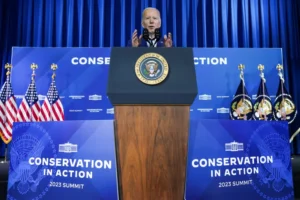
Tuesday saw the designation of two new national monuments by US President Joe Biden, conserving approximately 500,000 acres (200,000 hectares) of wilderness in the states of Texas and Nevada.
The announcement comes about a week after his government approved the largest oil drilling project for federal lands in Alaska, which generated controversy.
At the White House Conservation in Action Summit on Tuesday, Vice President Biden declared Castner Range in Texas and Avi Kwa Ame, also known as Spirit Mountain, to be national monuments protected by the Antiquities Act of 1906.
Also, he sent a presidential note to Secretary of Commerce Gina Raimondo requesting that her office create a new national marine sanctuary in the area of the ocean south of Hawaii that is approximately two million square kilometers (777,000 square miles) in size.
During the summit, Biden reminded the crowd, “Our country’s natural assets determine our identity as a nation. They are a birthright that must be passed down from one generation to the next.
As part of an executive order he issued in January 2021, just one week after his inauguration, Biden set a goal to conserve 30% of US land and water by 2030. Tuesday’s designations represent another step in that direction.
However there was some controversy surrounding the news. At the first White House Tribal Nations Summit in six years, Biden hinted at stronger protections for the region. For years, Indigenous tribes and environmental organizations had urged the government to designate Avi Kwa Ame a national monument.
Avi Kwa Ame, a desolate region dotted with gorges and rocky outcrops, is thought to be the ancestral home of ten Yuman-speaking tribes. Together with creosote shrubs and pinyon pines, the area around its white granite peak is home to bighorn sheep, desert tortoises, and Gila monsters.
As of Tuesday, Biden’s statement increased protections to an estimated 200,000 hectares (500,000 acres), making the region’s 13,564 hectares (33,518 acres) designated federal wilderness inaccessible to development.
That triumphs over energy company resistance. In order to build wind turbines and other facilities on the property, which is tucked away in the southern point of Nevada close to California and Arizona, Crescent Peak Renewables has been requesting permission for years.
As a result of the stronger federal safeguards for Awe Kwa Ame, Republican Nevada Governor Joe Lombardo criticized Biden for not consulting with local officials in a statement.
“I reached out to the White House to raise a number of concerns after understanding that the President was considering taking unilateral action,” Lombardo wrote.
On Tuesday’s announcement, he remarked, “I’m not surprised, though I’m still waiting for a response. “Although ‘Washington Knows Better’ policies like these might be praised by unaccountable special groups, they will harm our state’s economy and jobs.”
Nonetheless, indigenous organizations praised Biden’s initiatives. In his speech at the conference on Tuesday, Timothy Williams, the chairman of the Fort Mojave Indian Tribe, said how happy his people were to discover that Awe Kwa Ame will be safeguarded.
It’s a location we recognize as our creation. The first of our traditional songs is starting. And it’s the location that Native American tribes all over the Southwest regard as sacred,” he said. “What for our people had once been a far-off dream suddenly seemed attainable.”
As Biden considers a potential presidential candidacy in 2024, Nevada continues to be a crucial swing state for him. The results of the 2022 midterm elections were mixed for the incumbent Democrats, who lost the contest for governor of Nevada but won a crucial US Senate seat.
Castner Range, the second national monument, will be situated in the deeply red state of Texas. The range, which is close to El Paso, is a place of historical significance to the Native Americans living in the area and was used as a training ground during World War II. Also, it is a habitat for creatures like the western burrowing owl and comprises 40 documented archaeological sites.
In a news release on Tuesday, Under Secretary of the Army Gabe Camarillo said, “Castner Range has been an indelible part of US Army history, but now it’s time to write a new chapter concerning the future of this natural resource.”
Nonetheless, demonstrators in front of the White House conservation summit pressured the Biden administration to take greater action to save the nation’s natural resources and tribal territory. The Willow drilling project in Alaska, which would scavenge 180,000 barrels of oil per day from the Arctic wilderness, was of great concern.
The demonstrators unfurled a banner that said, “Stop the Willow oil project,” and chanted, “No more drilling on federal property!”




